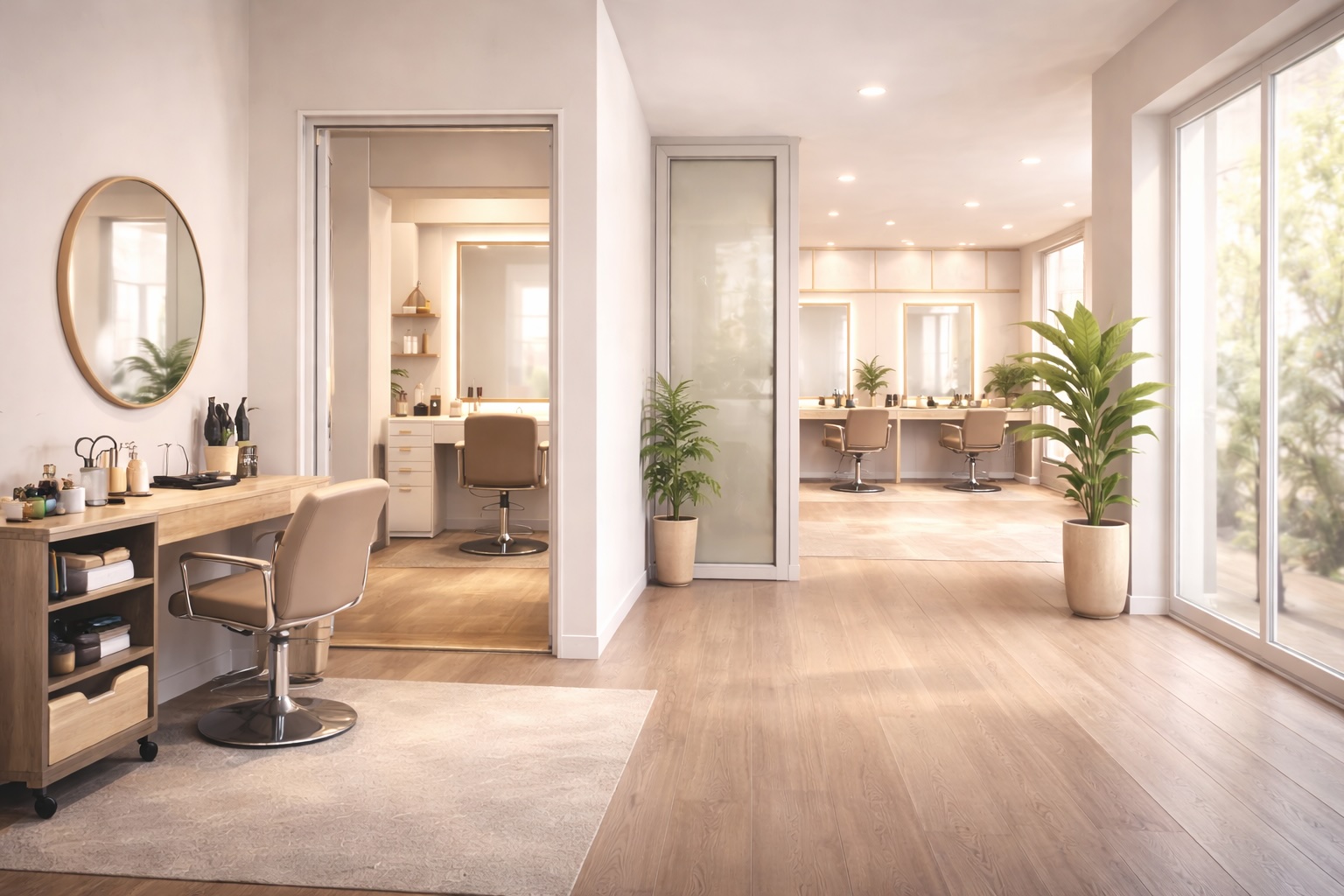
How to start up a beauty salon
Starting a Beauty Business: Salon, Suite, or Independent Pro
Starting a beauty business today looks very different than it did even a few years ago. You no longer need a large salon, multiple staff members, or a long-term lease to build a profitable beauty career. In this guide, we’ll walk through all modern ways to start a beauty business — whether you plan to open a full salon, rent a salon suite, or work as an independent beauty professional.
This guide is for:
- licensed beauty professionals ready to go independent
- professionals planning to open a salon or studio
- anyone turning beauty skills into a real business
Step 1: Choose Your Beauty Business Model
Before thinking about locations, staff, or marketing, the most important decision is how you want to operate.
Traditional Beauty Salon
A full salon with multiple services, staff, and a physical storefront.
Best for: owners planning to scale with employees
Higher costs: rent, payroll, insurance, management
More complexity: scheduling, staffing, overhead
Salon Suite
A private room inside a shared beauty complex.
Best for: independent professionals wanting autonomy.
Lower startup costs: no full build-out.
More control: pricing, schedule, client relationships.
Independent / Solo Beauty Professional
Working independently from a studio, home (where legal), or rented space.
Best for: fast launch, low risk, maximum flexibility
Lowest overhead: minimal staff and fixed costs
Requires systems: booking, payments, client management
Most beauty professionals today start with a suite or independent model and scale later if needed.
Step 2: Legal Requirements, Licensing & Insurance
Every beauty business must operate legally and safely.
At a minimum, you’ll need:
- a valid professional license
- business registration (varies by country/state)
- liability and professional insurance
Some services (barbering, piercing, advanced treatments) require additional licenses and inspections.
Always check local regulations before launching.
Step 3: Startup Costs & Budgeting
Startup costs vary dramatically depending on your business model.
Typical startup expenses include:
- licensing and permits
- insurance
- equipment and tools
- products and inventory
- software and systems
- marketing and branding
A traditional salon has higher upfront costs, while independent professionals can often launch with a fraction of the investment.
The key is understanding fixed vs variable costs before setting prices.
Step 4: Space, Location & Setup
Your workspace should match your business model.
Things to consider:
- visibility and accessibility
- client comfort and privacy
- compliance with health regulations
- utilities and ongoing expenses
Not all beauty businesses require high foot traffic. Many independent professionals grow successfully through referrals and online booking alone.
Step 5: Services You Offer
Define your services clearly before launching.
Common beauty services include:
- hair styling and coloring
- nails and extensions
- facials and skincare treatments
- waxing and hair removal
- makeup application
Focus on services that:
- match your license
- have consistent demand
- support sustainable pricing
Step 6: Systems, Scheduling & Operations
YThis is where many new beauty businesses struggle.
As an independent professional or small business owner, you need systems to:
- manage appointments
- handle cancellations and no-shows
- track clients and preferences
- accept payments
- monitor income
Without proper systems, growth becomes stressful and disorganized.
Successful independent professionals rely on software, not spreadsheets.
Step 7: Launch Checklists & Preparation
Before opening your doors, make sure nothing is missed.
Key areas to double-check:
- licenses and insurance
- equipment and supplies
- pricing structure
- booking availability
- payment setup
- client communication
Structured checklists help avoid costly mistakes during launch.
Step 8: Marketing Your Beauty Business
Once operational, attracting clients becomes the priority.
Effective marketing channels include:
- social media (especially Instagram)
- local search visibility
- referrals and reviews
- content and education
- paid ads (optional)
Independent professionals often grow faster by focusing on local visibility and client experience, not large ad budgets.
Common Mistakes to Avoid
Many beauty businesses fail not because of talent, but because of poor setup.
Avoid:
- overspending before demand exists
- choosing the wrong business model
- underpricing services
- ignoring systems and scheduling
- relying only on social media for clients
Why Many Beauty Professionals Choose Independence First
Starting independently allows you to:
- launch faster
- reduce financial risk
- build a loyal client base
- learn the business side early
Many successful salon owners begin as independent professionals and expand later — not the other way around.
Final Thoughts
Starting a beauty business is no longer limited to opening a traditional salon.
Today’s professionals have more flexible, profitable options than ever before.
The key is choosing the right model, setting up proper systems, and building your business step by step.
When you’re ready to manage bookings, clients, and growth efficiently, the tools you choose matter as much as your skills.
Benefits of Starting a Beauty Business (Salon, Suite, or Independent)
Starting a beauty business can be a smart move when you want more control over your schedule, income, and client experience. The biggest benefits usually come down to four things:
- Independence: You control your pricing, services, and the way you work — whether you’re solo, in a suite, or building a team.
- Flexibility: You can build around your lifestyle, set working hours that match demand, and scale at your pace.
- Income upside: When your pricing, retention, and booking systems are solid, your earning potential increases because you’re no longer capped by hourly wages.
- Ownership & reputation: Over time, you build an asset — your client base, your brand, and your reviews — that can grow into a salon, a studio, or a team.
For many professionals, starting as independent or in a suite is the fastest path to stability, with the option to expand later.
Drawbacks (and How to Reduce the Risk)
Starting a beauty business also comes with real risks — but most are manageable if you plan correctly:
- Financial risk: Rent, equipment, and supplies can add up quickly.
- Reduce it: start lean, choose a lower-overhead model (suite/independent), and track fixed vs variable costs early.
- Competition: Most markets are crowded.
- Reduce it: differentiate through a clear specialty, strong reviews, consistent client experience, and a simple local marketing system.
- Time commitment: Early stages require admin work, not just services.
- Reduce it: set up booking and client systems from day one so growth doesn’t turn into chaos.
- Pricing pressure: Many new businesses underprice out of fear.
- Reduce it: build pricing around costs + time + demand, and refine based on retention and rebooking.
Starting a beauty business can be one of the most rewarding ways to turn your skills into long-term income — especially when you choose the right model (salon, suite, or independent) and set up systems that keep your bookings and operations under control.
Download our mobile apps

.webp)








